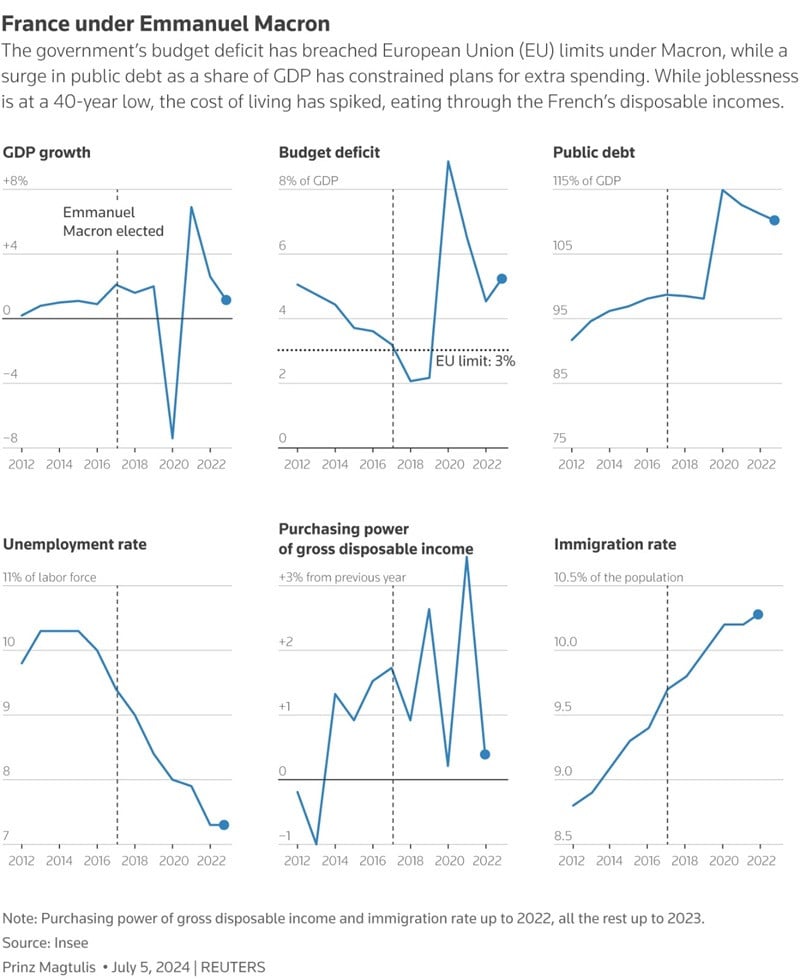- Latest opinion polls predict RN to win most National Assembly seats but it may fall short of an absolute majority
PARIS: French voters turned out in force for the second round of a parliamentary election on Sunday that could see the far-right National Rally (RN) emerge as the strongest party, severely denting President Emmanuel Macron’s authority.
Turnout stood at 26.3% by around noon (1000 GMT), up from 18.99% during the second round of voting in 2022, the Interior Ministry said. It was the highest midday turnout level since 1981, pollsters Harris Interactive and Ipsos said, illustrating strong public interest in an election that has polarised political views.
The latest opinion polls have forecast the RN to win the most seats in the National Assembly, but predicted it may fall short of an absolute majority. A hung parliament would herald a prolonged period of instability and policy deadlock in the euro zone’s second-biggest economy.
If the nationalist, eurosceptic RN did secure a majority, it would usher in France’s first far-right government since World War Two and send shockwaves through the European Union at a time when populist parties are strengthening support across the continent.
Voting closes at 6 p.m. (1600 GMT) in towns and small cities and 8 p.m. in bigger cities. Pollsters will deliver initial projections based on early counts from a sample of voting stations at 8 p.m.
Macron called the snap election after his ticket was trounced by the RN in European Parliament elections last month, a move apparently aimed at wrong-footing his rivals in a legislative election. The vote is pitting a centrist government against opposition movements from the left and far right.
“The country is facing three radically opposed views of society,” said Olivier Grisal, a retiree, as he walked towards his polling site in the middle-class town of Conflans Sainte-Honorine, west of Paris, with his wife.
Opinion polls forecast Marine Le Pen’s RN will emerge as the dominant force as voters punish Macron over a cost of living crisis and being out of touch with the hardships people face.
However, the RN is seen failing to reach the 289-seat target that would outright hand Le Pen’s 28-year-old protégé Jordan Bardella the prime minister’s job with a working majority.
The far right’s projected margin of victory has narrowed since Macron’s centrist Together alliance and the left-wing New Popular Front (NPF) pulled scores of candidates from three-way races in the second round in a bid to unify the anti-RN vote.
“France is on the cliff-edge and we don’t know if we’re going to jump,” Raphael Glucksmann, a member of the European Parliament who led France’s leftist ticket in last month’s European vote, told France Inter radio last week.
Security concerns
Political violence surged during the three-week campaign. Interior Minister Gerald Darmanin has said authorities recorded more than 50 physical assaults on candidates and campaigners.
Some luxury boutiques along the Champs Elysees boulevard, including the Louis Vuitton store, barricaded windows and Darmanin said he was deploying 30,000 police amid concerns of violent protests should the far right win.
A longtime pariah for many due to its history of racism and antisemitism, the RN has broadened its support beyond its traditional base along the Mediterranean coast and the de-industrialised north, tapping into voter anger at Macron over straitened household budgets, security, and immigration worries.
“French people have a real desire for change,” Le Pen told TF1 TV on Wednesday.
Whatever the final result, Macron’s political agenda now appears dead, three years before the end of his presidency.
“Our country is going through a serious crisis, we are only a few hours away from a new order,” said engineer Pascal Cuzange who said he cast his vote for Macron’s alliance more in protest against the alternatives than in support for the president.
“There is a risk that the country becomes ungovernable.”

An RN-led government would raise major questions over who really speaks for France in Europe and on the global stage, and over where the EU is headed given France’s powerful role in the bloc. EU laws would be almost certain to restrict its plans to crack down on immigration.
Bardella says the RN would decline to form a government if it doesn’t win a majority, although Le Pen has said it might try if it falls just short.
France is not used to building broad cross-party coalitions in the event of a hung parliament. Prime Minister Gabriel Attal, who looks likely to lose his job, is among a number of political leaders who have ruled such a scenario out. Another possibility is a caretaker government that manages day-to-day affairs but without a reform mandate.
The RN pledges to reduce immigration, loosen legislation to expel illegal migrants and tighten rules around family reunification. On the economy, the RN has watered down some of its frontline policy pledges to shore up household spending and lower the retirement age, constrained by France’s ballooning budget deficit.
France’s business elite is anxious about the risk of volatile politics and instability ahead.
French asset prices have risen on expectations the RN won’t win a majority, with banking shares up and the risk premium investors demand to hold French debt narrowing. Economists question whether the RN’s hefty spending plans are fully funded.





















